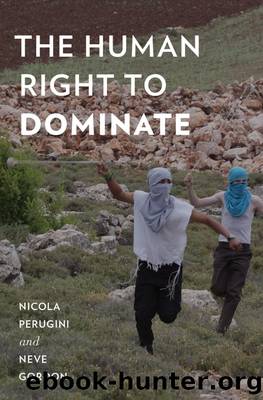The Human Right to Dominate by Perugini Nicola; Gordon Neve;

Author:Perugini, Nicola; Gordon, Neve; [Nicola Perugini and Neve Gordon]
Language: eng
Format: epub
Publisher: Oxford University Press USA - OSO
Published: 2015-05-04T13:00:00+00:00
Jewish Outposts
Yesha for Human Rights, one of the NGOs petitioning in favor of Margalit Har-Shefiâs release, was founded in 2002 by Orit Strook. Strook is a Jewish settler who in 1982 was evacuated from a settlement in the Sinai and currently lives in a Jewish settlement inside the Palestinian city of Hebron, located in the occupied West Bank.7 She was one of the key figures who initiated the new wave of settler human rights activism by creating the first settler human rights NGO after the Israeli army evacuated a Jewish family from an outpost near Hebron during the second Palestinian Intifada. In order to understand how and why settlers began creating human rights organizations, however, it is important to zoom out and examine what was happening on the ground with respect to settlements during the Oslo years (1993â2000).
In 1996, in the midst of the Oslo peace process, Israel promised the US administration that it would stop building new settlements in the OPT. But while the Israeli government was carrying out negotiations with Palestinians, it encouraged approximately 50,000 Jewish citizens to move from Israel to the occupied West Bank and Gaza Strip. Practically all of the Oslo settlers moved into new neighborhoods that were built by expanding existing settlements. Simultaneously, the Israeli government actively supported the settler movement by establishing scores of âillegal outpostsââoutside the boundaries of existing settlementsâproviding electricity and water to these new settlements, and constructing roads that would allow the settlers to reach them.8
By 2001, five years after the United Statesâ prohibition on new settlements, the settlers had built more than 60 new âillegal outpostsâ on expropriated Palestinian land.9 The Israeli government frequently depicted the Jewish settlers as defiant or unruly citizens, even as it transferred millions of dollars to support their ârecalcitrantâ behavior, primarily because this allowed the stateâwhen criticizedâto claim that it is a democracy made up of a vibrant civil society that has many voices. In this way it could deflect external pressure and absolve itself of responsibility by attributing the expropriation of Palestinian land to illegal initiatives carried out by âextremistâ settler groups. In fact, however, the âillegal outpostsâ are not really illegal (since Israeli law regulates and very often condones them) and are not really outposts; they are simply settlements.
During the surge of so-called outpost building, Israelâs police and military carried out symbolic acts of law enforcement in which settlers who were residing in the new outposts were evicted. Parallel to this process of settlement expansion and very sporadic law enforcementâoften during periods when there was increasing international pressure to restart the peace processâthe Israeli military carried out massive house demolitions against Palestinians, a practice on which many Israeli and Palestinian human rights NGOs focused their advocacy.10 It is within this legal and political landscape of settler dispossession of Palestinian land and government demolitions of Palestinian homes that Yesha for Human Rights, the organization founded by Orit Strook, started its activities. Strook is a pioneer in the sense that she initiated an institutional change within the context of human rights in Israel/Palestine.
Download
This site does not store any files on its server. We only index and link to content provided by other sites. Please contact the content providers to delete copyright contents if any and email us, we'll remove relevant links or contents immediately.
| Civil Rights | Discrimination |
| General | Human Rights |
Day by Elie Wiesel(2779)
The Age of Genius by A. C. Grayling(2584)
Gideon's Spies: The Secret History of the Mossad by Gordon Thomas(2337)
The Gulag Archipelago (Vintage Classics) by Aleksandr Solzhenitsyn(2096)
FATWA: Hunted in America by Pamela Geller(2009)
Columbine by Dave Cullen(1863)
Men Explain Things to Me by Rebecca Solnit(1724)
The Rule of Law by Bingham Tom(1690)
Anatomy of Injustice by Raymond Bonner(1657)
Examples & Explanations: Administrative Law by William F. Funk & Richard H. Seamon(1640)
Three Cups of Tea by Greg Mortenson(1613)
The Source by James A. Michener(1602)
That Every Man Be Armed by Stephen P. Halbrook(1577)
ADHD on Trial by Michael Gordon(1573)
Future Design by Unknown(1566)
Gideon's Spies by Gordon Thomas(1500)
Palestinian Walks by Raja Shehadeh(1494)
Constitutional Theory by Carl Schmitt(1451)
Nothing to Envy by Barbara Demick(1445)
